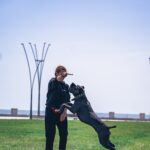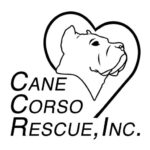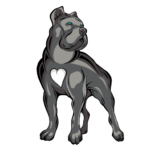Table of Contents
Your Ultimate Guide to a Loyal and Powerful Companion
If you are looking for a loyal and protective companion, you may want to consider a Cane Corso, pronounced “KAH-Nay KOR-So”. These powerful Italian mastiffs are known for their impressive size and strength, as well as their calm and affectionate nature. Its name is derived from the Italian word for dog, cane, and the Latin term cohors, meaning “protector” or “bodyguard.”
Cane Corsos have a rich history, dating back to ancient Rome where they were used as guard dogs and hunters. The Cane Corso belongs to the subcategory of working breeds called mollosus dogs, or mollosers, named for the Molossi, an ancient Greek people thought to have bred giant, big-boned guardian dogs of Mastiff type. Today, they are popular pets and can be trained for a variety of activities, including obedience, agility, and tracking.
One of the defining characteristics of the Cane Corso is their imposing size. These dogs can weigh 80-120 pounds and stand 23-28″ tall at the shoulder. Because of their large size, the are sometimes called King Corso. Despite their size, however, they are known for their gentle and affectionate nature towards their families. These dogs can live from 10-12 years on average. Their ears are sometimes cropped, but it is not a required standard, and the tail is usually docked.
Cane Corso can come in a number of colors including Black, Gray, Fawn, Black Brindle, Gray Brindle, Red, and Chestnut Brindle. They have a short, coarse double coat. The length of the undercoat depends on where the dog lives. In colder climates, they will have thicker and longer undercoats than dogs in warm or hot climates. Breeds with double coats will shed throughout the year, but will shed heavily in the spring.
AKC Official Breed Standard
Cane Corso Standard: The ideal against which dogs are judged at shows, originally laid down by a parent breed club and accepted officially by national or international bodies. READ HERE
Basic grooming like brushing, bathing and nail trimming are typical for this breed. Typically, adult Cane Corso will eat 4-5 cups of food per day, this will vary based on weight.
Cane Corsos, plural Cani Corsi, are also highly intelligent and trainable, making them excellent working dogs. They are known for their loyalty and protective instincts, which makes them great watchdogs. Exercise and training are most important to a cane corso, daily activity and exercise will help keep them physically and mentally fit. Without exercise, they might find thier own unwanted activities like digging holes or chewing your household items. Having a large space, yard or area to live and play is ideal.
If you are considering adding a Cane Corso to your family with children, it is important to note that they require proper training and socialization. These dogs are naturally dominant, so they need a firm and consistent hand in training starting at an early age. They make great family dogs when trained properly. This dog will not do well in a home with anyone who is afraid of or dislikes dogs or is unable to handle a large dog.

Cani Corsi bred by standards are less likely to inherit troubling health conditions. However, some hereditary health problems can occur in the breed. They can be prone to hip dysplasia, eye conditions such as entropion, ectropion, and cherry eye, mange, and gastric dilatation-volvulus or bloating.
Overall, the Cane Corso is a wonderful breed that is both loyal and protective. If you are considering adding one to your family, be sure to do your research and find a reputable breeder or rescue organization. With proper training and care, your Cane Corso can be a loving and faithful companion for years to come.

Places To Adopt Or Find Cane Corso For Sale:
If you think the cane corso could be right for you, consider searching for a cane corso rescue group to adopt cane corso puppies or adults. Expect to pay on average of $1,500+ for cane corso puppies, and even more for pedigreed cane corso puppies.
Breed Bans
Cane Corso and other breeds may be banned in some cities around the country and could be subject to breed-specific legislation that is active in several hundred cities across the U.S. For example, areas of Colorado have a ban on Cane Corsos. Please check your city and housing guidelines before adopting.















